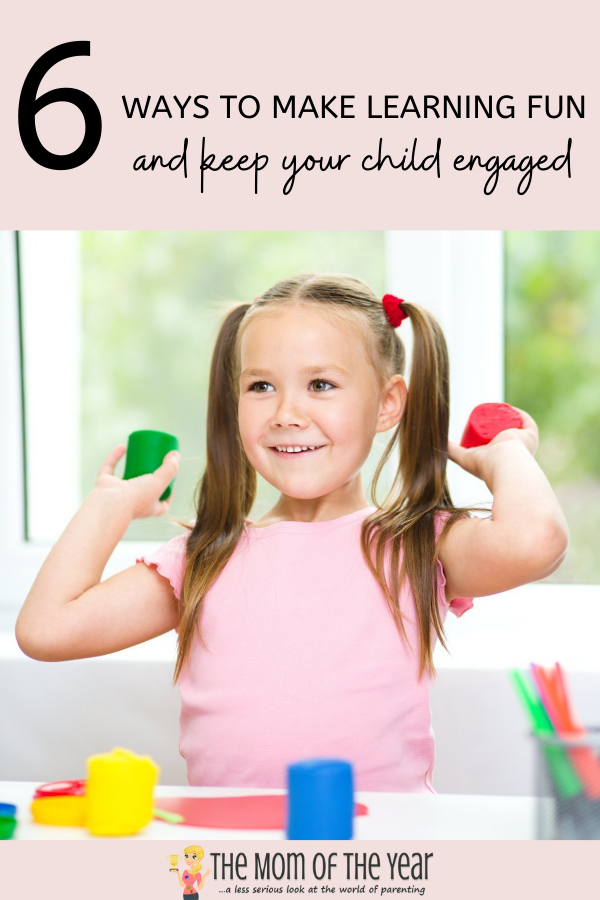Stimulating and developing your child’s mind and body is best done through play, especially when they’re at a younger age. Playing and learning can teach your child so much about the world and about themselves, build their confidence, help their social development and build the foundation of their relationship with education.

Allowing your child to learn through play, especially in their early years at home, will help them develop a love of learning and get them curious about the world around them. Here are some fun ways to mix play and education.
6 Ways to Make Learning Fun
Storytelling
A love for reading can form the foundation for a young academic mind, and this is something that can be developed from a very young age. Reading and telling stories to your child will develop their creativity and imagination and encourage them to want to read more themselves.
For children that might get a little impatient with storytime, keep things interesting by adding new and exciting elements. Buy new books regularly, get invested and involved in the story, and you could even buy puppets to make storytime more of an experience.
Clay and Play-Dough
Letting your little ones run wild with all kinds of creation is a great opportunity for learning that shouldn’t be missed. Working with clay will allow your children to develop their fine motor skills and hand-eye coordination, and help them develop attention to detail.
This could also be used as an opportunity to teach them more about what they’re making with their clay – animals, dinosaurs, cars, you name it.
Puzzles
It may come as no surprise that puzzles are a great educational toy for your kids of any age. This can develop focus and concentration, as well as logical thinking. Puzzles can teach your little ones about the concept of a “whole”, basic shapes and even life skills like patience and goal setting.
Puzzles and similar logical games are good for all ages (as long as they’re age-appropriate) and can teach new different skills as your children get older. Plus – it might keep them quiet for just a little while.
Nature
Letting your children play outside has endless benefits, both for their physical and mental health, as well as for their learning and development. Playing outside will allow them to build respect for the environment as well as spike their curiosity about the world.
Learning about plants, water, soil, sunlight and all the goes with it will be a scientific foundation for their school careers, so take the time to show them the ins and outs of the garden, the park, the river, and any other places you could take them to in nature.
Cooking
Yes, your kids can learn in the kitchen too. Loads of children love getting involved in the kitchen. Whether you’re simply making a quick dinner, or especially plan to bake cookies with them, letting them get involved and play a role in the event will be largely beneficial.
Working in the kitchen can help them learn how to follow instructions and work on motor skills and coordination. On top of this, they can learn about food, health, heat and other important concepts. Older kids can even take the opportunity to learn a few important basic cooking skills that will help them in the future!
Board Games
This might seem like plain old fun, but trust us when we say that there’s a whole lot of learning to be done at family game night.
Loads of kids board games have been specially designed to be fun and educational at the same time, they can learn about science, biology, language, maths and any other topic they might be interested in, if you find the right game for it. This is also a great way to learn and practice social skills like taking turns, sharing and how to cope well with losing.
The Bottom Line
There are so many ways to spend fun yet educational time with your kids, and even ways to let them learn and play quietly by themselves. Developing curiosity and an interest in your kids is the first and most important step, and the rest will follow naturally.
Children are born curious about the world around them and are usually very willing to learn, especially in ways that they’re not forced into. Providing them with the tools and opportunities to discover things by themselves is a great way to give them the best chance to develop a love for learning.
Latest posts by Meredith (see all)
- Bushcraft Camping: How To Master The Art Of Wilderness Living - April 21, 2025
- The Dollhouse Academy Book Club Discussion - February 14, 2025
- Somewhere Beyond the Sea Book Club Discussion - January 10, 2025


helene says
very nice post thank you
Meredith says
Thanks for reading, Helene! 🙂
The Teacher Treasury says
I love the activities, especially the board games and cooking. Very interactive and good bonding activity.